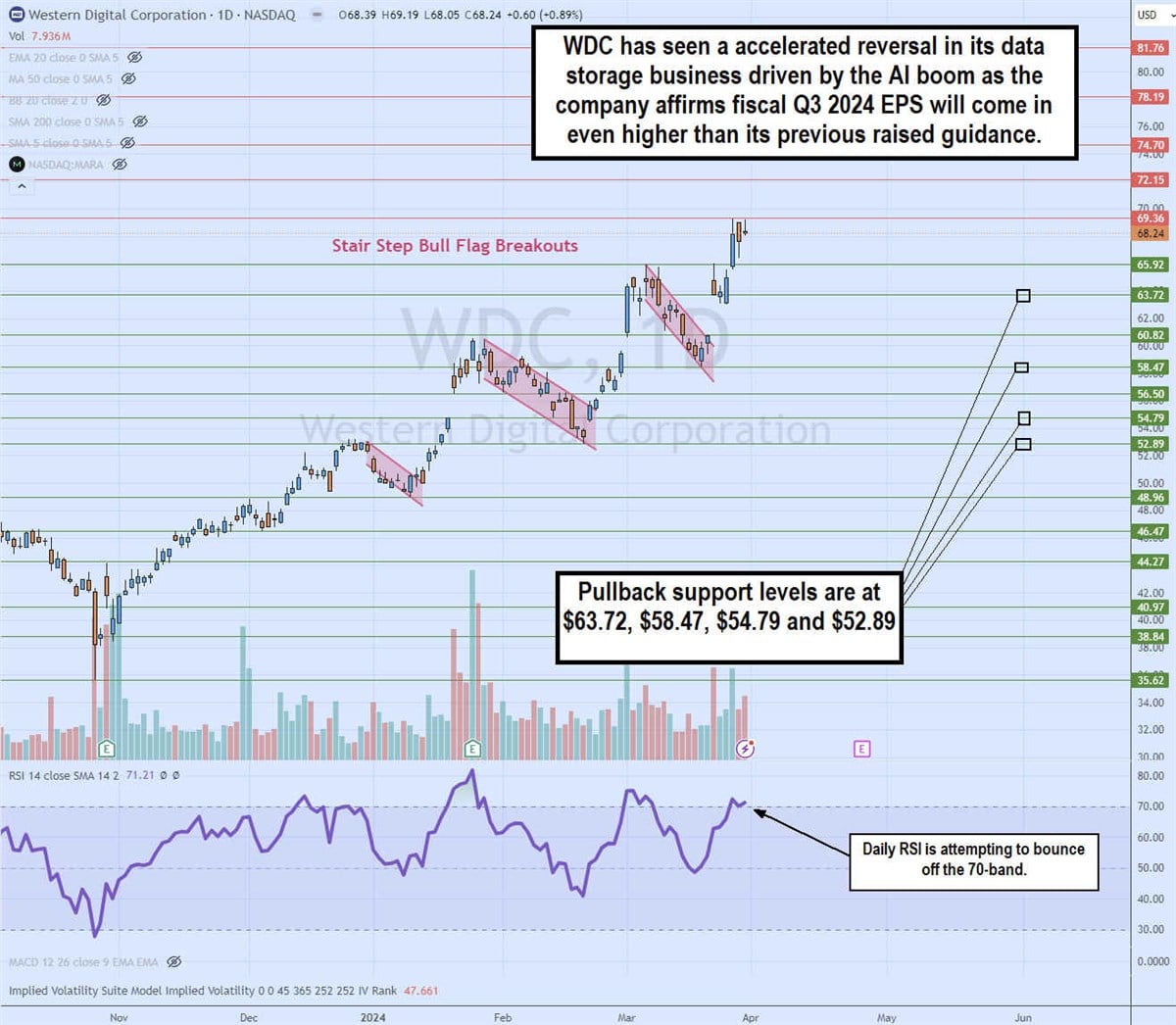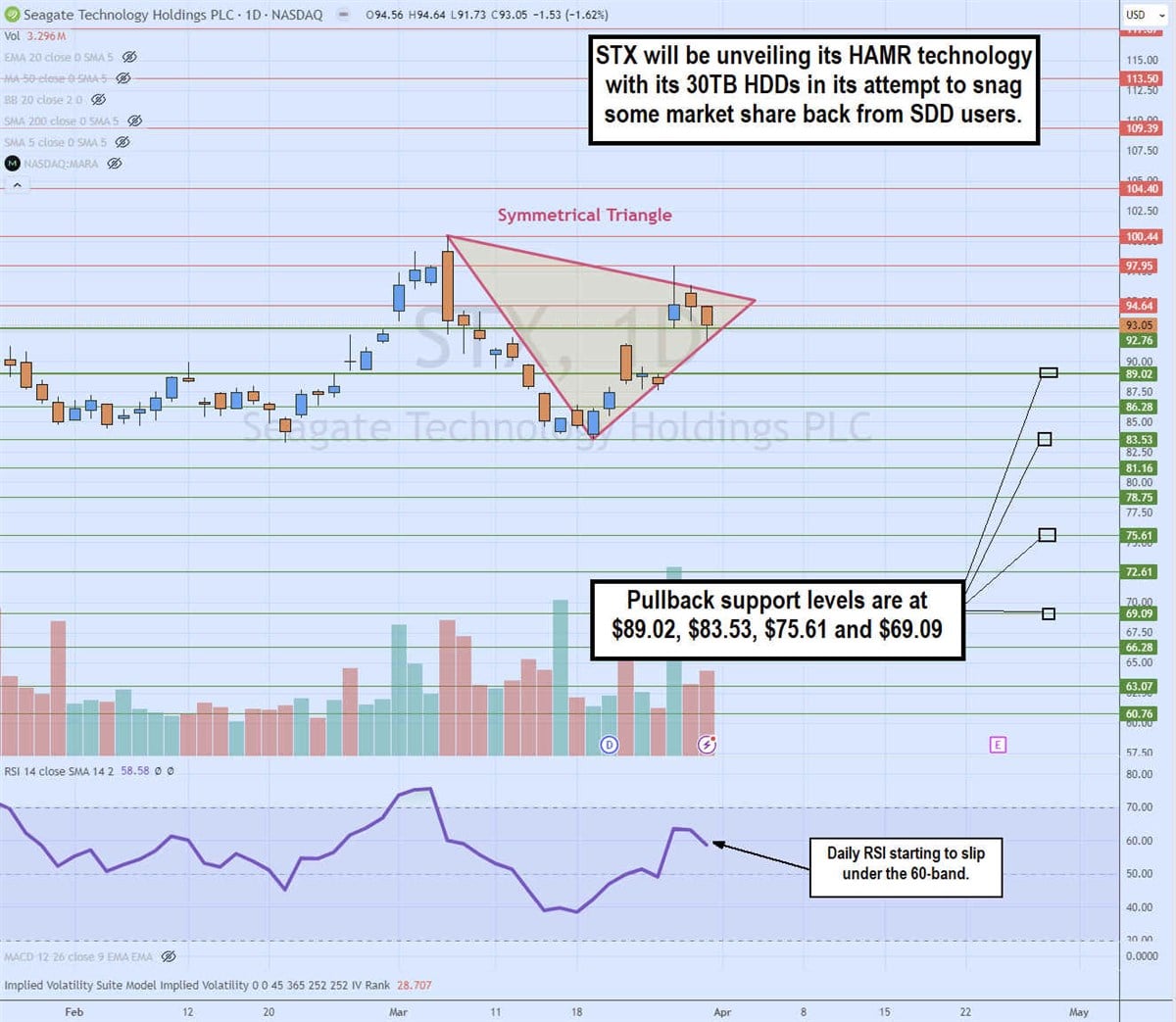
The artificial intelligence (AI) boom has accelerated revenues for various companies in the computer and technology sector. The obvious benefactor and leader of the NASDAQ: NVDA">AI wave is Nvidia Co. (NASDAQ: NVDA), with its 90% market share of GPUs. AI requires heavy-duty processing power but also a massive amount of data to train AI models. This requires the ability to store oceans of data, as evidenced by the surge in revenues for Micron Technology Inc. (NASDAQ: MU), maker of DRAM, NAND and flash memory chips. The benefits continue to trickle down to the data storage device companies that buy mountains of memory storage chips to meet the insatiable demand in their businesses. Here are 2 leading data storage device makers that are thriving on the AI boom as their troughs are reversing back into peaks.
Western Digital
Western Digital Co. (NASDAQ: WDC) manufactures hard disk drives (HDDs) and solid-state drives (SSDs). As a leader in the data storage industry, they have been migrating to the forefront of SSD with its acquisition of flash drive maker SanDisk in 2016. Their products range from traditional HDDs, which are mechanical storage devices for bulk data storage, to SSDs, which are faster and more reliable due to no moving parts.
Western Digital also manufactures data center storage systems as well as consumer storage devices, including SSDs, USB drives and external hard drives. Their business is booming with the AI trend. The company has plans to separate its HDD, which focuses on traditional HDs and mechanical storage solutions, and Flash business, focusing on NAND flash memory, units into 2 separate companies.
AI Accelerating Turnaround
Western Digital reported a fiscal Q2 2024 EPS loss of 69 cents, beating consensus analyst estimates for a loss of $1.12 by 43 cents. Revenues fell 2.4% YoY to $3.03 billion, beating consensus estimates for $3 billion. The surge in data storage device demand caused them to raise their forward guidance.
Raised Guidance
Western Digital raised forward guidance for fiscal Q3 2024 with EPS of a loss of 10 cents to a profit of 20 cents, crushing consensus estimates for a loss of 31 cents. Revenues are expected to grow from $3.20 billion to $3.40 billion, beating consensus estimates of $3.15 billion.
Re-raising Guidance
On March 5, 2024, at the Morgan Stanley Technology, Media & Telecom Conference, Western Digital announced fiscal Q3 2024 EPS exceeded the high end of its previous guidance of 20 cents versus 9 cents consensus analyst estimates. CEO Goeckeler noted that they delivered best-in-class NAND gross margin by a significant amount. The HDD business saw a return of the hyperscalers in the United States back from "more robust conversions." China had 100% sequential growth in the HDD business.
Goeckeler commented, “If we look at the guidance ranges we provided, we expect to be near the high end of guidance of the range we provided. But each business is performing better from a profitability point of view. A couple of points of additional gross margin in each business. All the rest of the numbers are within guidance ranges. So we expect this quarter, we expect on an EPS basis to exceed the high end of our guidance range.”
Analyst Upgrade
Evercore was prompted to initiate coverage on Western Digital with an Outperform with a price target of $80.
Western Digital analyst recommendations and price targets can be found on MarketBeat. Western Digital’s peer and competitor stocks can be found with the MarketBeat stock screener.

Daily Stair Step Bull Flags
The daily candlestick chart on WDC illustrates stair-step bull flag patterns. There are a series of 3 consecutive bull flags, each reaching higher highs. The most recent bull flag formed after peaking at $65.92 on March 6, 2024, forming a parallel channel down to $58.47 before gapping and going higher to $69.36. The daily relative strength index (RSI) is attempting to bounce off the 70-band. Pullback support levels are at $63.72, $58.47, $54.79 and $52.89.
Seagate Technology
Seagate Technology plc (NASDAQ: STX) is arguably the leader in the HDD segment in the United States. The company continues to push the envelope with HDD technology in its attempt to catch up with the SDD in terms of speed and efficiency at a cheaper price. SSD has no moving parts, whereas HDD comprises several mechanisms that need to work flawlessly to operate. HDD capacity far exceeds SDD at much cheaper prices. Still, AI requires speed as well as storage capacity, giving SSD the edge as indicated by all-flash array storage solutions provider Pure Storage Inc. (NYSE: PSTG) and Hewlett Packard Enterprise Co. (NYSE: HPE) results.
HAMR Technology
Seagate Technology will launch its heat-assisted magnetic recording (HAMR) technology that will increase the storage capacity for HDDs up to 3X. Capacity gains are made by doubling or tripling the area density of traditional HDDs, resulting in a significant boost on a single platter.
The potential capacity of 5 to 10 Terabytes per square inch (Tbps) compared to the current 1 Tbps to 2 Tbps capacity. HAMR uses a small laser to heat a small spot in the hard drive, making it temporarily easier to write on, which enables the magnetic head to write data in a significantly smaller space than ever before. Get AI-powered insights on MarketBeat.
Mozaic 3+ HDD Platform
Seagate announced the HAMR technology will be incorporated into its Mozaic 3+ HDD platform to drive 30TB capacities and beyond. It has partnered with Sony Inc. (NYSE: SNE) for its laser diode technology to increase data storage capacity while reducing operational expenses. The Mozaic 3+ platform will achieve densities of 3TB per platter with goals of achieving 4TB and 5TB+ per platter. They allow for doubling the capacity in the same space and reduce embodied carbon per TB by 55%.
Seagate Technology analyst ratings and price targets are at MarketBeat.

Daily Symmetrical Triangle
The daily candlestick chart on STX illustrates a symmetrical triangle. The descending upper trendline formed at $100.44 on March 6, 2024. The ascending lower trendline formed at $83.53 on March 19, 2024. They meet at the apex point. STX should break through the upper trendline or break through the lower trendline before the apex point.
The daily RSI is starting to fall under the 60-band. Pullback support levels are at $89.02, $83.53, $75.61 and $69.09.






